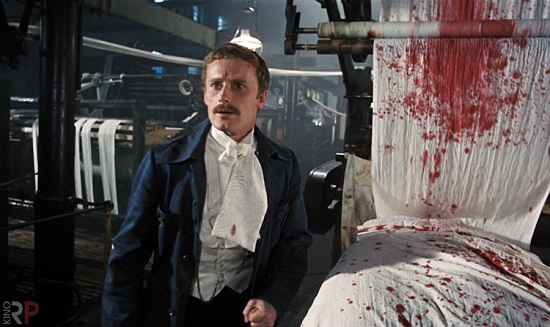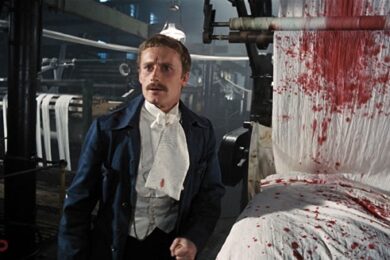Andrzej Wajda is one of Poland’s most celebrated filmmakers, but until now there has been little chance to see one of his most critically admired films, 1974’s The Promised Land (Ziemia Obiecana) in its original, three-hour cinema version. A new restoration and DVD by Second Run is aiming to change that, giving audiences a chance to appreciate the film as Wajda originally made it. It’s well worth discovering; both for its artistic innovation and to explore its deep thematic connections with the rest of his work and with Polish cinema as a whole.
Wajda is perhaps best known for his films about World War II, from his early War Trilogy comprising A Generation (1954), Kanał (1956) and Ashes and Diamonds (1958) right up to 2007’s Katyń, about the 1940 massacre in which his father was murdered. He’s also known for his concern with politics, history and Polish national identity, for example his portrayal of Stalinism in Poland, Man of Marble (1976). He was subsequently involved with the trade union and social movement Solidarność, as depicted in his Palme d’Or winning Man of Iron (1981), and his most recent film is a biography of its leader Lech Wałęsa – Wałęsa: Man of Hope (2013). Another strand to his oeuvre is the fact that many of his films are adaptations of work by important Polish and Russian writers, including Dostoyevsky, Bulgakov, Jerzy Andrzejewski, Adam Mickiewicz, Jarosław Iwaszkiewicz, Stanisław Wyspiański, and, in the case of The Promised Land, Władysław Reymont.
Reymont’s novel, first published in 1897-8, has been compared to Zola and Dickens for its authentic, detailed depiction of the realities of the industrial revolution. It tells the story of Karol Borowiecki, a Polish nobleman, Moryc Welt, a Jewish businessman, and Maks Baum, a German industrialist, three friends who join forces to establish a new textile factory in Łódź – the ‘promised land’. They represent three groups that historically held interests in Łódź’s cotton and wool industries; they don’t, of course, represent the interests of the Polish peasants to whom Łódź also promised work and hope when rural farming failed them. Nonetheless, the novel’s equally concerned with the brutal effects industrial exploitation had on the poor; this is the story of capitalism from all angles.
Wajda’s film of The Promised Land is a fantastical journey through 19th-century Łódź, a series of dizzying, swooping directorial flourishes that take in every detail of poverty and excess. Wajda isn’t afraid to depict grotesquerie and cruelty, and many scenes are garish, positively nightmarish. We see gilded palaces and theatres, champagne and jewels, and we see the squalor and deprivation that allows them to exist. We see peasants slumped under the walls of those factories that offer so much false hope. People starve and die, but chimneys continue to spew black smoke into the sky, uncaring. The factory is the locus of dreams, here, and it’s also the constant around which all life revolves. As one is burnt down, another is built. This is a morality tale, and the factory is a place where the worst of humanity runs unchecked.
Those older industrialists who try to cling onto something from the past – tradition, decency, honour – end up having to burn their own factories for the insurance money, or shoot themselves to escape the disgrace of unpaid debt. Rather be like our three heroes, the ethos of Łódź at the time would say – they’re monsters, all of them, but success as a man is measured here not just by wealth, but by a rejection of humanity. That is, rejection both of humaneness but also, literally, of human beings. Karol (Daniel Olbrychski) not only lectures a clerk about understanding that he is one of a million small cogs in a large machine, he sees the gruesome death of a worker in a factory accident as a waste of the cloth that got soaked with his blood. Maks (Andrzej Seweryn) argues against his father’s insistence on employing people out of loyalty, rather than replacing them with machines. Flesh has no dignity, whether it’s being torn apart by suicide and machinery, or castigated by the mother who calls her daughter ruined because her boss forced her into an orgy.
Łódź itself is, if not exactly a character in the film, then certainly more than a setting. It’s an entity, a unique and looming presence. People speak lovingly of the city, even as its industry chews them up and spits them out (sometimes literally, if they step too close to the machines). One industrialist spells it out – he wants Łódź to grow, to have palaces, gardens, commerce and money – but he ignores the people who live there. Wajda went to film school in Łódź, but says he only got to know its industrial side when researching this film. The city changed so astonishingly little during the wars that what look like elaborate, beautifully recreated sets are actual streets, factories and houses, untouched since the industrial revolution. It’s a symbol of a Poland that survived, an expansive antithesis to the claustrophobia of the ruined Warsaw that provided the backdrop for the War Trilogy.
It’s a setting inextricable from its subject, too. The social and artistic context The Promised Land emerged from was Positivism, a movement that saw industrialisation and trade as the best future for a Poland that had spent the last century being subjugated by first Napoleon, then the Russian Empire. This pragmatic desire to look to the future rather than cling to a culture that had suffered so much is a sensibility that runs through the story, embodied most directly by Karol, who rejects his heritage and tells his father being nobility only holds him back from the pursuit of money.
Money trumps all. It is the raison d’ être of industry, but here it’s also more than that. The director Andrzej Żuławski, who was Wajda’s assistant and who persuaded him to read The Promised Land, called it a MacGuffin, “something of substance that would provide him with a plot”. Any desire these characters could have has been sublimated into the pursuit of money, but it’s not doing them any good. Indeed, they seem happiest at the times they don’t have capital, for then the dream of money is strongest and desire for it most fulfilling. When they succeed, the dream is poisoned by the difficulties money brings. This is Reymont and Wajda’s fable of capitalism; the political cruelty of the system is represented by the corruption it wreaks on the men’s souls.
Before this new restoration, The Promised Land was rarely seen outside of Poland in this uncut version (a bowdlerised version did make it onto DVD in 2000). But even after the film’s initial release, when it won the Golden Prize at the Moscow Film Festival and an Academy Award nomination for Best Foreign Language Film in 1975, American and UK distributors declined to show it. The usual reason given for this is fear that the film’s portrayal of its Jewish characters would be seen as anti-Semitic. In a new interview, included on the disc, Wajda claims to have been very hurt by this, and says it happened merely because Americans at the time thought all of Poland was anti-Semitic. He says they found particular fault with the portrayal of Lucy Zucker (Kalina Jędrusik), the industrialist’s wife who has an affair with Karol. She’s a Jewish woman who behaves licentiously, and is set in contrast to the purity of Karol’s other women, Polish Anka and German Mada; then again, she isn’t the only woman seen indulging in promiscuity, and it isn’t characterised as related to her Jewishness. In a thoughtful essay, also included, David Thomson says it’s hard to discern anti-Semitism in the film. While Moryc (Wojciech Pszoniak) and other Jewish characters are obsessed with making money, so are Karol and Maks, and Thomson thinks it’s more a depiction of the bourgeoisie. Moryc is as greedily amoral as the others, but he’s also the most joyful and exuberant, and the places where the film adopts his point of view rather than Karol’s have an extra liveliness, twisted though it is. It feels as if, being the one without the burden of inherited property and the expectations that go with it, Moryc is freest in embracing capitalism. Sometimes, this does feel a little uncomfortable to watch, but that discomfort comes from a complex set of factors, rather than simple, crude stereotyping.
Wajda hoped The Promised Land would be well-received in the West. He calls it an American film, because it’s about money, and perhaps that feeling doesn’t actually clash too much with his admission that he crafted some parts of the plot to appease the contemporary Communist regime. It’s certainly accessible – as Thomson says in his essay, it doesn’t require the viewer to have an understanding of the obscure symbols of Polish Romanticism, unlike some of Wajda’s work. Indeed, the story’s relevance has outlasted its 19th-century setting and the film’s Cold War context, and it remains an urgent and fascinating narrative of human morality.
Second Run’s DVD reissue of The Promised Land is released on the 10th of November.



